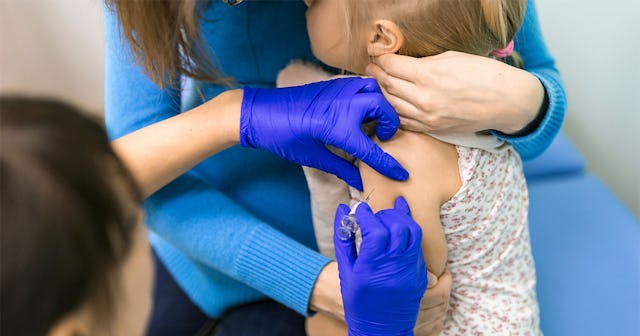How To Help Manage 'Getting A Shot' Anxiety In Children

Does anyone really like getting a shot? Probably not — but children can be particularly anxious about shots and needles and the anticipation that comes along with the injection. Now that a COVID-19 vaccine for younger children is available, shot anxiety is a problem that some parents may soon be facing with their children. But what can we do about it? Scary Mommy spoke to Dr. Natasha Burgert, Pediatrician with Forbes Health, to get a bit of insight on shot anxiety and how parents can help to ease their children’s minds.
Burgert explained that a lot of kids are anxious about shots because they hurt, but often that pain is not as bad as the psychological build up. She said that it is not uncommon for a child to say, “That didn’t hurt,” after receiving a shot. She gave us a few tips to help our kids get through the dreaded shot day.
First, she said that we should take our kids along to get our own shots. If they can see their parent’s bravery, it can make getting a shot easier for a child. “I encourage parents to get vaccines with their kids, acknowledging the pain of the injection and the calming technique used to get past the discomfort. For example, ‘Ouch – that hurt. But, I can take a few deep breaths to calm my body and now I feel better. I’m safe and I feel okay. Now, let’s go get ice cream,’” she suggested.
Burgert says that it is not wise to promise that an appointment will not include shots. If there ends up being a scheduled vaccine, it can cause a child to distrust their parent, which we never want. She also said that when you talk about shots with your kids, make it short and sweet. We must be honest and to the point and not to make it seem like such a big deal, further instilling fear in your child.
Burgert also warned that you should never use shots as a threat. We do not want to see our doctors and nurses as enemies. They are there to help us and keep us well, not to punish us. Berger emphasized that when we associate a medical intervention as a punishment for our behavior, it can also make kids distrust our medical system.
It is important to trust our doctors and nurses because they are experts in providing care for all of us. Nearly all children experience some sort of shot anxiety, she said, but pediatric nurses have all kinds of techniques to help combat those fears. “They know all the tips and tricks to make shot visits go as smoothly as possible. Before the shots, ask your child’s nurse what they recommend or how they prefer to administer the vaccines. Many have special holds or administration techniques that parents can choose to participate in. Despite best efforts, however, there are some children who will need to be held to administer shots safely. A correct hold is necessary for the safety of both the child and the nurse administering the shot. In these instances, we involve the parents to assist in the process,” Burgert explained.
Getting through the quick poke of a vaccine can be made a bit easier with some help from some brain teasers and even topical treatments. These can make the experience easier and can help to make your child less anxious the next go around. Burgert offered the following suggestions.
- First, when the shot is being administered, try to trick your pain receptors. She said that having a child cough three times can be a great way to do this. The nurse or doctor will administer the shot during the second cough and what the child perceives as pain can be decreased.
- Get what she calls, “Elsa Spray.” This is ethyl chloride and it is a topical anesthetic that can be used to decrease the pain from a shot. She suggested that you spray the cold spray on the skin about a minute before the shot to help numb the skin and can make the shot hurt less. Associating it with a beloved character can help a child to trust and become more comfortable.
- Similar to the spray is a topical lidocaine cream. This can be put on the location of the injection at least 30 minutes before to help ease the pain.
- If the anxiety is severe, you may talk to your medical provider about taking a short-acting anxiety medication. She said that in conjunction with the medication, parents should seek support in dealing with needle fear to help in future situations.
Burgert said that parents must face their child’s fear head on, so as not to cause long-term anxiety about shots and needles. If we manage the expectations up front by explaining how quickly things will go and what they can look forward to after the shot is over, that can help.
“Fostering a calm, positive relationship around shots is so important in young children because shot anxiety can lead to a lifelong phobia. Needle phobia and shot anxiety is a marker for future vaccine hesitancy, so directly addressing and treating anxiety when your child is young has the power to improve their health care over their lifetime. Managing shot anxiety and needle phobia is one pathway to long-term vaccine acceptance, and improves the likelihood of your child receiving proper preventative health care when they get older,” Burgert recommended.
In our current climate when vaccines are so important, we must be sure that we are taking our children’s fear seriously and mitigating the best that we can, so that as they grow, their fears will lessen.
This article was originally published on